MBA502: Reflective Essay on Emotional Intelligence and Culture
VerifiedAdded on 2023/01/19
|8
|1803
|78
Essay
AI Summary
This reflective essay, completed for the MBA502 course, explores the concepts of emotional intelligence (EI), cultural intelligence (CQ), and diversity through self-assessment and reflection. The assignment required the student to complete two EI tests, and have two friends complete the same tests to provide an external perspective. The essay utilizes the Johari Window model to analyze the results, identifying strengths, weaknesses, and areas for improvement in interpersonal communication and leadership skills. The essay also discusses the importance of reflection in personal and professional development, the role of EI in global organizations, and the significance of cultural diversity in the workplace. References include various academic sources supporting the analysis and conclusions presented in the essay.
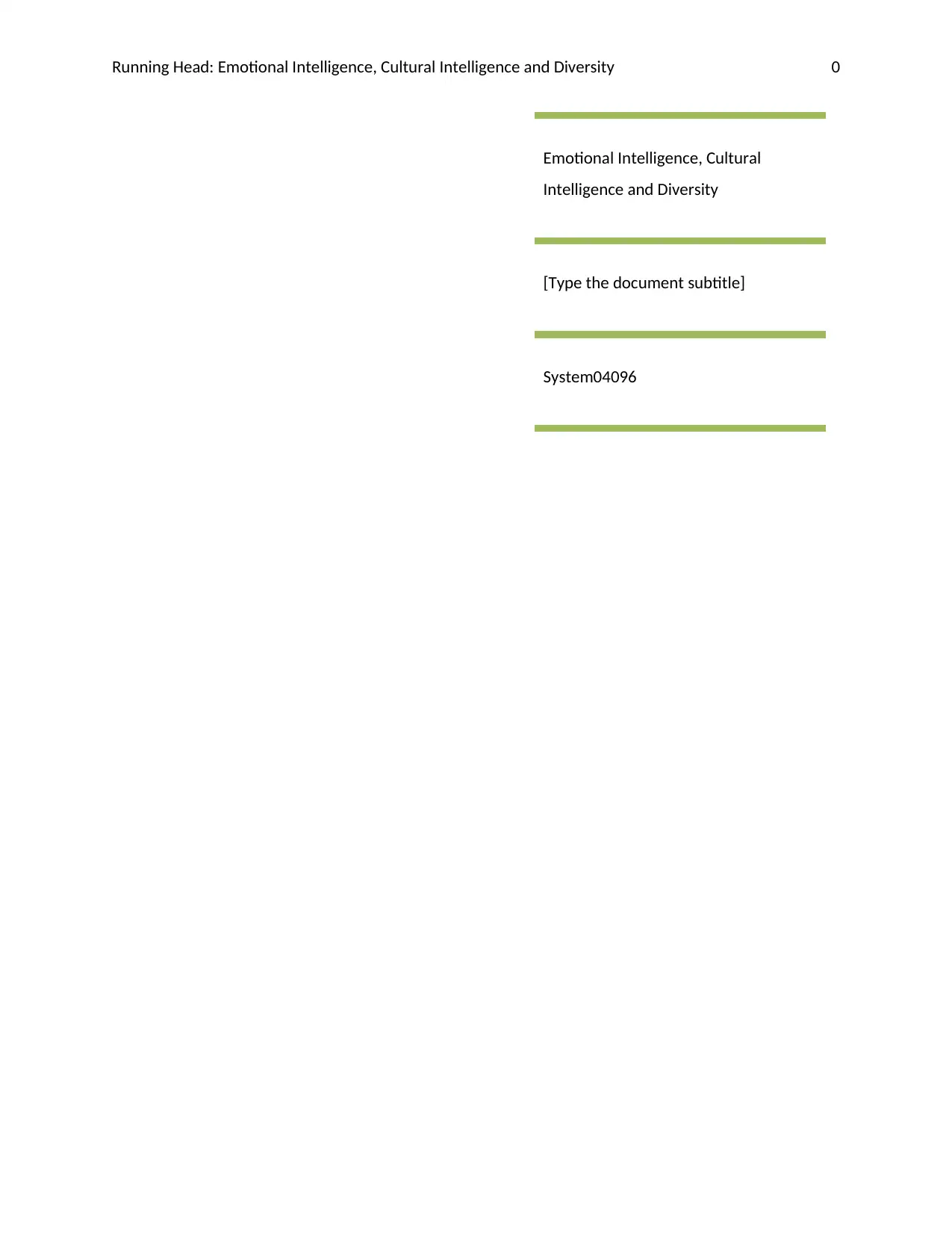
Running Head: Emotional Intelligence, Cultural Intelligence and Diversity 0
Emotional Intelligence, Cultural
Intelligence and Diversity
[Type the document subtitle]
System04096
Emotional Intelligence, Cultural
Intelligence and Diversity
[Type the document subtitle]
System04096
Paraphrase This Document
Need a fresh take? Get an instant paraphrase of this document with our AI Paraphraser
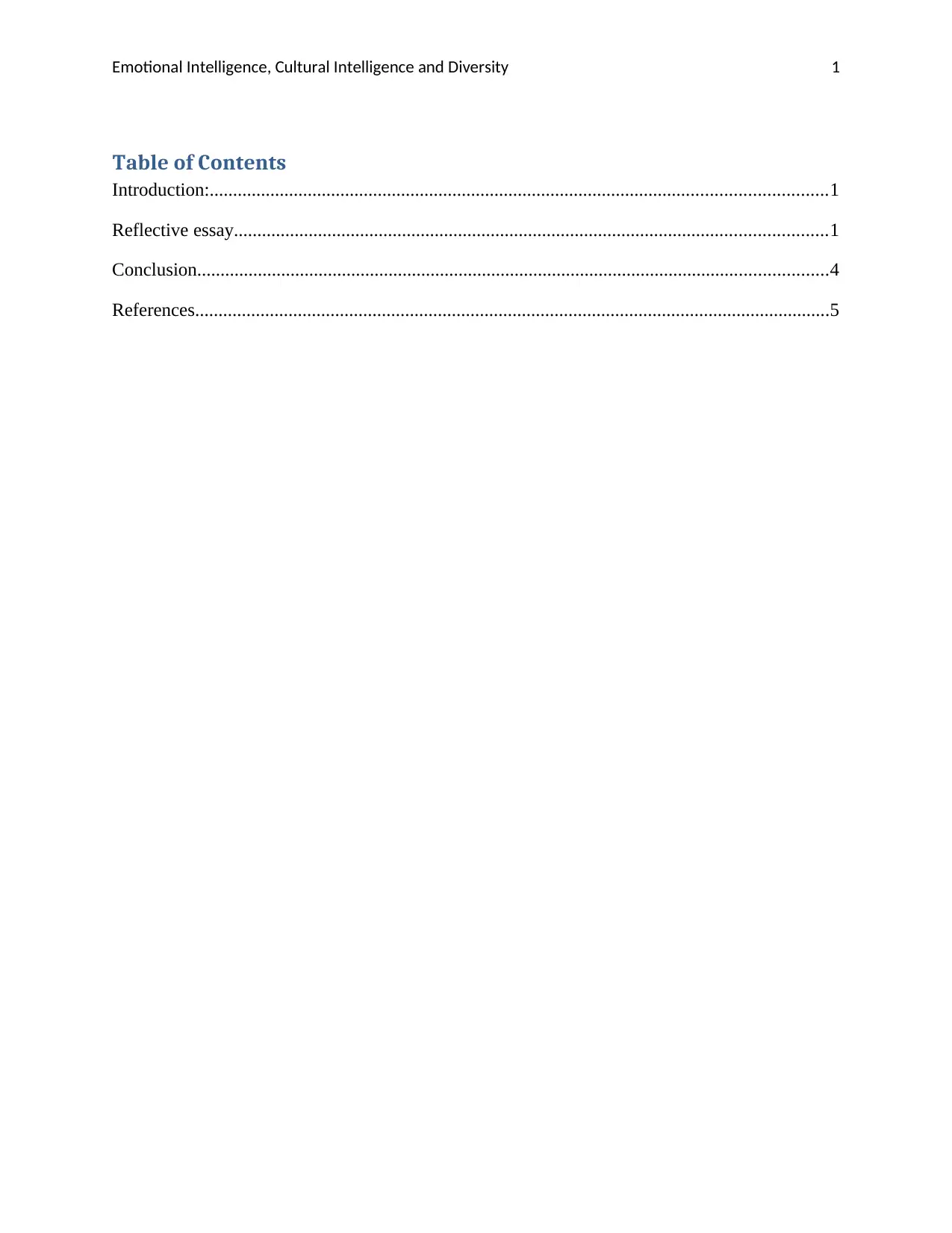
Emotional Intelligence, Cultural Intelligence and Diversity 1
Table of Contents
Introduction:....................................................................................................................................1
Reflective essay...............................................................................................................................1
Conclusion.......................................................................................................................................4
References........................................................................................................................................5
Table of Contents
Introduction:....................................................................................................................................1
Reflective essay...............................................................................................................................1
Conclusion.......................................................................................................................................4
References........................................................................................................................................5

Emotional Intelligence, Cultural Intelligence and Diversity 2
Introduction:
Refection is a best practice to know about ourselves and learn from our different experiences,
which are coming from activities and processes. Many theories are used for understand reflection
and their advantages in personal and professional development. Every reflection has a critical
analysis behind it (Fook, 2010). Many reflective tools and techniques are available in the market
to understand reflective leaning. Most of the people learn from their experiences. Therefore, it is
necessary to know about the strengths and weaknesses of person through reflection and self-
awareness (Gray, 2007). This reflective essay will explain about the reflection activities using
Johari window model. Johari window model is used for self-analysis through different questions
(Halpern, 2009).
Reflective essay
In that week, I learnt about the self-awareness using different theoretical and practical sessions,
such as Johari’s Windows activity, and many others. In education system, reflective learning is
so helpful to revise different things. It makes level of understanding high. There are many
models, which is used for reflection, such as Kolb’s reflection cycle, Gibbs reflection model, and
many others (Pretorious & Ford, 2016).
I learnt about the many things in that reflection processes. In addition, emotional intelligence is a
factor, which is used to understand about the strength and weaknesses of ourselves. It provides
different ways to use emotions as intelligences in different processes, such as, education,
business, professional development, and many others ( Salazar, 2017).
I learnt about the self-analysis from that activity in which my friends asked some questions about
me. In addition, Johari window model is an effective model for improving interpersonal
communication as well as managerial effectiveness in a person. It provides help to find strengths
and weaknesses of a person. Therefore, he or she can make desired changes in their
communication and make it more effective (Saxena, 2015). I put my answers in different parts of
Johari window model. In open area, I write about my skills, which are known to me and others,
such as punctual, honest, and many others.
Introduction:
Refection is a best practice to know about ourselves and learn from our different experiences,
which are coming from activities and processes. Many theories are used for understand reflection
and their advantages in personal and professional development. Every reflection has a critical
analysis behind it (Fook, 2010). Many reflective tools and techniques are available in the market
to understand reflective leaning. Most of the people learn from their experiences. Therefore, it is
necessary to know about the strengths and weaknesses of person through reflection and self-
awareness (Gray, 2007). This reflective essay will explain about the reflection activities using
Johari window model. Johari window model is used for self-analysis through different questions
(Halpern, 2009).
Reflective essay
In that week, I learnt about the self-awareness using different theoretical and practical sessions,
such as Johari’s Windows activity, and many others. In education system, reflective learning is
so helpful to revise different things. It makes level of understanding high. There are many
models, which is used for reflection, such as Kolb’s reflection cycle, Gibbs reflection model, and
many others (Pretorious & Ford, 2016).
I learnt about the many things in that reflection processes. In addition, emotional intelligence is a
factor, which is used to understand about the strength and weaknesses of ourselves. It provides
different ways to use emotions as intelligences in different processes, such as, education,
business, professional development, and many others ( Salazar, 2017).
I learnt about the self-analysis from that activity in which my friends asked some questions about
me. In addition, Johari window model is an effective model for improving interpersonal
communication as well as managerial effectiveness in a person. It provides help to find strengths
and weaknesses of a person. Therefore, he or she can make desired changes in their
communication and make it more effective (Saxena, 2015). I put my answers in different parts of
Johari window model. In open area, I write about my skills, which are known to me and others,
such as punctual, honest, and many others.
⊘ This is a preview!⊘
Do you want full access?
Subscribe today to unlock all pages.

Trusted by 1+ million students worldwide
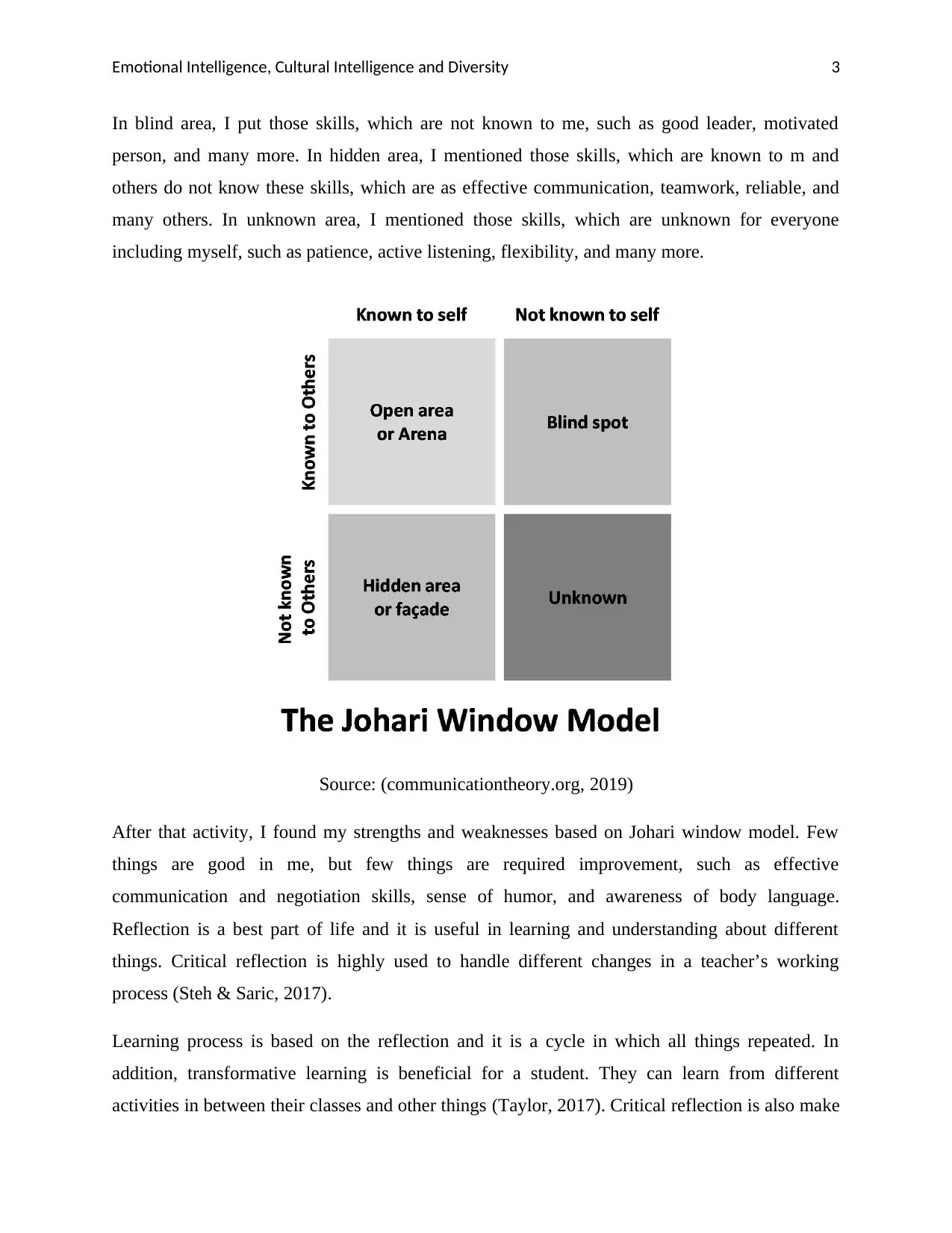
Emotional Intelligence, Cultural Intelligence and Diversity 3
In blind area, I put those skills, which are not known to me, such as good leader, motivated
person, and many more. In hidden area, I mentioned those skills, which are known to m and
others do not know these skills, which are as effective communication, teamwork, reliable, and
many others. In unknown area, I mentioned those skills, which are unknown for everyone
including myself, such as patience, active listening, flexibility, and many more.
Source: (communicationtheory.org, 2019)
After that activity, I found my strengths and weaknesses based on Johari window model. Few
things are good in me, but few things are required improvement, such as effective
communication and negotiation skills, sense of humor, and awareness of body language.
Reflection is a best part of life and it is useful in learning and understanding about different
things. Critical reflection is highly used to handle different changes in a teacher’s working
process (Steh & Saric, 2017).
Learning process is based on the reflection and it is a cycle in which all things repeated. In
addition, transformative learning is beneficial for a student. They can learn from different
activities in between their classes and other things (Taylor, 2017). Critical reflection is also make
In blind area, I put those skills, which are not known to me, such as good leader, motivated
person, and many more. In hidden area, I mentioned those skills, which are known to m and
others do not know these skills, which are as effective communication, teamwork, reliable, and
many others. In unknown area, I mentioned those skills, which are unknown for everyone
including myself, such as patience, active listening, flexibility, and many more.
Source: (communicationtheory.org, 2019)
After that activity, I found my strengths and weaknesses based on Johari window model. Few
things are good in me, but few things are required improvement, such as effective
communication and negotiation skills, sense of humor, and awareness of body language.
Reflection is a best part of life and it is useful in learning and understanding about different
things. Critical reflection is highly used to handle different changes in a teacher’s working
process (Steh & Saric, 2017).
Learning process is based on the reflection and it is a cycle in which all things repeated. In
addition, transformative learning is beneficial for a student. They can learn from different
activities in between their classes and other things (Taylor, 2017). Critical reflection is also make
Paraphrase This Document
Need a fresh take? Get an instant paraphrase of this document with our AI Paraphraser
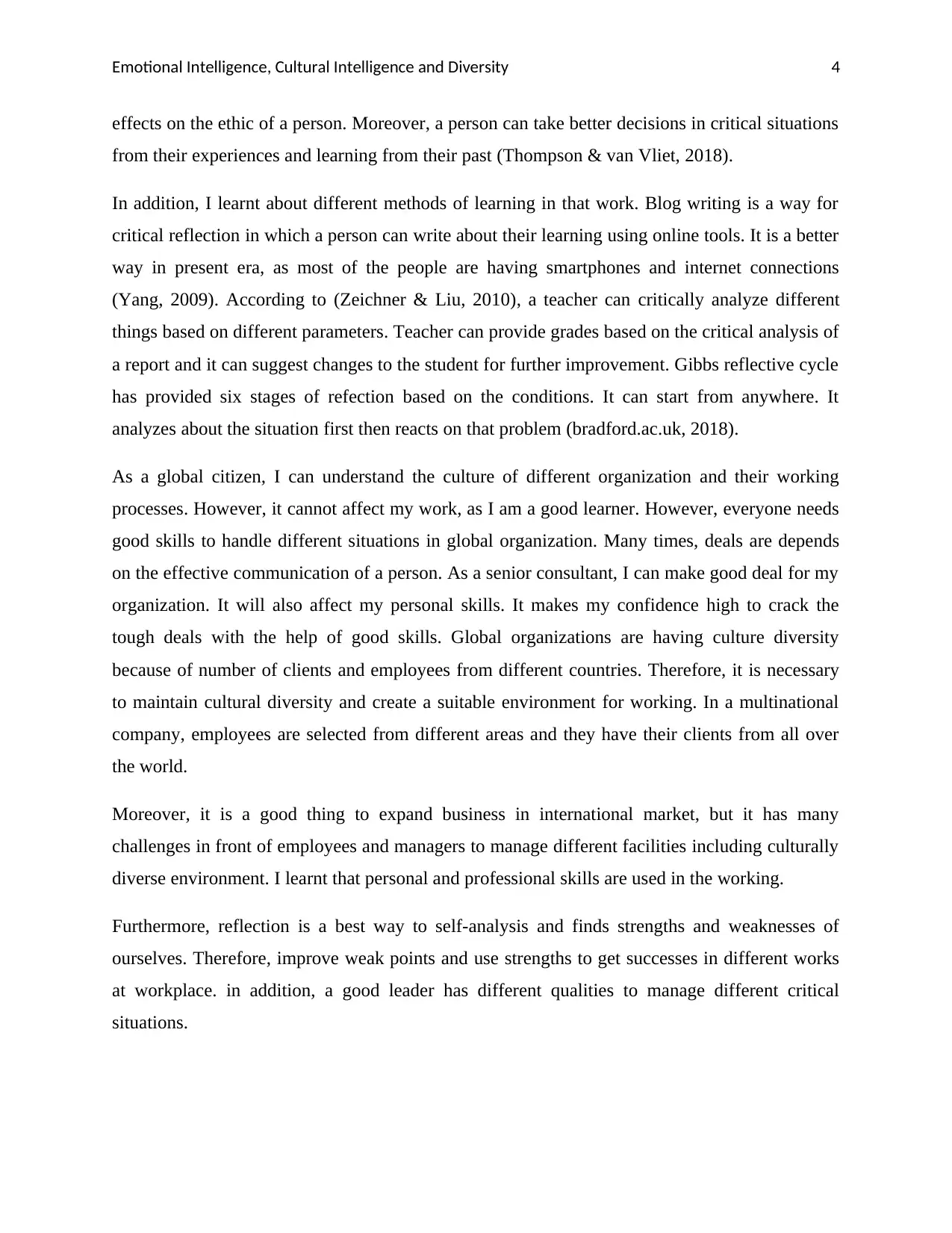
Emotional Intelligence, Cultural Intelligence and Diversity 4
effects on the ethic of a person. Moreover, a person can take better decisions in critical situations
from their experiences and learning from their past (Thompson & van Vliet, 2018).
In addition, I learnt about different methods of learning in that work. Blog writing is a way for
critical reflection in which a person can write about their learning using online tools. It is a better
way in present era, as most of the people are having smartphones and internet connections
(Yang, 2009). According to (Zeichner & Liu, 2010), a teacher can critically analyze different
things based on different parameters. Teacher can provide grades based on the critical analysis of
a report and it can suggest changes to the student for further improvement. Gibbs reflective cycle
has provided six stages of refection based on the conditions. It can start from anywhere. It
analyzes about the situation first then reacts on that problem (bradford.ac.uk, 2018).
As a global citizen, I can understand the culture of different organization and their working
processes. However, it cannot affect my work, as I am a good learner. However, everyone needs
good skills to handle different situations in global organization. Many times, deals are depends
on the effective communication of a person. As a senior consultant, I can make good deal for my
organization. It will also affect my personal skills. It makes my confidence high to crack the
tough deals with the help of good skills. Global organizations are having culture diversity
because of number of clients and employees from different countries. Therefore, it is necessary
to maintain cultural diversity and create a suitable environment for working. In a multinational
company, employees are selected from different areas and they have their clients from all over
the world.
Moreover, it is a good thing to expand business in international market, but it has many
challenges in front of employees and managers to manage different facilities including culturally
diverse environment. I learnt that personal and professional skills are used in the working.
Furthermore, reflection is a best way to self-analysis and finds strengths and weaknesses of
ourselves. Therefore, improve weak points and use strengths to get successes in different works
at workplace. in addition, a good leader has different qualities to manage different critical
situations.
effects on the ethic of a person. Moreover, a person can take better decisions in critical situations
from their experiences and learning from their past (Thompson & van Vliet, 2018).
In addition, I learnt about different methods of learning in that work. Blog writing is a way for
critical reflection in which a person can write about their learning using online tools. It is a better
way in present era, as most of the people are having smartphones and internet connections
(Yang, 2009). According to (Zeichner & Liu, 2010), a teacher can critically analyze different
things based on different parameters. Teacher can provide grades based on the critical analysis of
a report and it can suggest changes to the student for further improvement. Gibbs reflective cycle
has provided six stages of refection based on the conditions. It can start from anywhere. It
analyzes about the situation first then reacts on that problem (bradford.ac.uk, 2018).
As a global citizen, I can understand the culture of different organization and their working
processes. However, it cannot affect my work, as I am a good learner. However, everyone needs
good skills to handle different situations in global organization. Many times, deals are depends
on the effective communication of a person. As a senior consultant, I can make good deal for my
organization. It will also affect my personal skills. It makes my confidence high to crack the
tough deals with the help of good skills. Global organizations are having culture diversity
because of number of clients and employees from different countries. Therefore, it is necessary
to maintain cultural diversity and create a suitable environment for working. In a multinational
company, employees are selected from different areas and they have their clients from all over
the world.
Moreover, it is a good thing to expand business in international market, but it has many
challenges in front of employees and managers to manage different facilities including culturally
diverse environment. I learnt that personal and professional skills are used in the working.
Furthermore, reflection is a best way to self-analysis and finds strengths and weaknesses of
ourselves. Therefore, improve weak points and use strengths to get successes in different works
at workplace. in addition, a good leader has different qualities to manage different critical
situations.

Emotional Intelligence, Cultural Intelligence and Diversity 5
Conclusion
It is concluded from the above sections of this reflective essay that Johari window model is
beneficial for improvement of effective communication. It provides strengths and weaknesses of
a person with the help of activity. This reflective essay has explained about the two tastes, which
was taken by my friends. I analyzed that I have good skills in myself but few weaknesses make
me slow in my work. Therefore, I need to improve those skills and make them my strengths.
This reflective essay has described about all the learning from that week and Johari window
model usages in real life to identify strengths and weaknesses of a person. Therefore, they can
improve their weak points and make new skills for their professional and personal development.
Finally, it is concluded that learning is an important thing to create new skills in ourselves.
Reflective practices are very helpful in those improvements. Global organization has cultural
diversity but I can manage those things with the help of my skills, such as effective
communication, leadership, and many others.
Conclusion
It is concluded from the above sections of this reflective essay that Johari window model is
beneficial for improvement of effective communication. It provides strengths and weaknesses of
a person with the help of activity. This reflective essay has explained about the two tastes, which
was taken by my friends. I analyzed that I have good skills in myself but few weaknesses make
me slow in my work. Therefore, I need to improve those skills and make them my strengths.
This reflective essay has described about all the learning from that week and Johari window
model usages in real life to identify strengths and weaknesses of a person. Therefore, they can
improve their weak points and make new skills for their professional and personal development.
Finally, it is concluded that learning is an important thing to create new skills in ourselves.
Reflective practices are very helpful in those improvements. Global organization has cultural
diversity but I can manage those things with the help of my skills, such as effective
communication, leadership, and many others.
⊘ This is a preview!⊘
Do you want full access?
Subscribe today to unlock all pages.

Trusted by 1+ million students worldwide
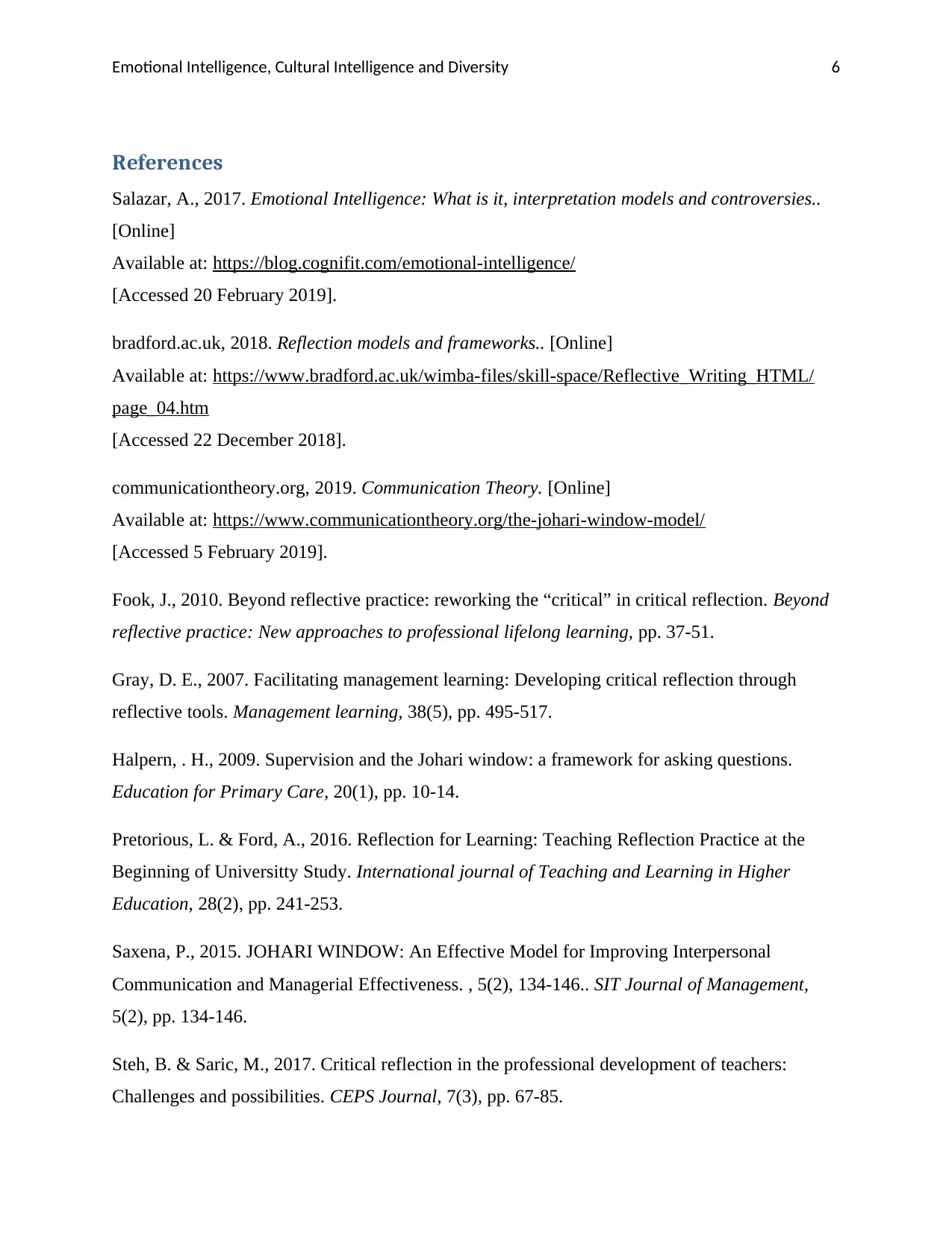
Emotional Intelligence, Cultural Intelligence and Diversity 6
References
Salazar, A., 2017. Emotional Intelligence: What is it, interpretation models and controversies..
[Online]
Available at: https://blog.cognifit.com/emotional-intelligence/
[Accessed 20 February 2019].
bradford.ac.uk, 2018. Reflection models and frameworks.. [Online]
Available at: https://www.bradford.ac.uk/wimba-files/skill-space/Reflective_Writing_HTML/
page_04.htm
[Accessed 22 December 2018].
communicationtheory.org, 2019. Communication Theory. [Online]
Available at: https://www.communicationtheory.org/the-johari-window-model/
[Accessed 5 February 2019].
Fook, J., 2010. Beyond reflective practice: reworking the “critical” in critical reflection. Beyond
reflective practice: New approaches to professional lifelong learning, pp. 37-51.
Gray, D. E., 2007. Facilitating management learning: Developing critical reflection through
reflective tools. Management learning, 38(5), pp. 495-517.
Halpern, . H., 2009. Supervision and the Johari window: a framework for asking questions.
Education for Primary Care, 20(1), pp. 10-14.
Pretorious, L. & Ford, A., 2016. Reflection for Learning: Teaching Reflection Practice at the
Beginning of Universitty Study. International journal of Teaching and Learning in Higher
Education, 28(2), pp. 241-253.
Saxena, P., 2015. JOHARI WINDOW: An Effective Model for Improving Interpersonal
Communication and Managerial Effectiveness. , 5(2), 134-146.. SIT Journal of Management,
5(2), pp. 134-146.
Steh, B. & Saric, M., 2017. Critical reflection in the professional development of teachers:
Challenges and possibilities. CEPS Journal, 7(3), pp. 67-85.
References
Salazar, A., 2017. Emotional Intelligence: What is it, interpretation models and controversies..
[Online]
Available at: https://blog.cognifit.com/emotional-intelligence/
[Accessed 20 February 2019].
bradford.ac.uk, 2018. Reflection models and frameworks.. [Online]
Available at: https://www.bradford.ac.uk/wimba-files/skill-space/Reflective_Writing_HTML/
page_04.htm
[Accessed 22 December 2018].
communicationtheory.org, 2019. Communication Theory. [Online]
Available at: https://www.communicationtheory.org/the-johari-window-model/
[Accessed 5 February 2019].
Fook, J., 2010. Beyond reflective practice: reworking the “critical” in critical reflection. Beyond
reflective practice: New approaches to professional lifelong learning, pp. 37-51.
Gray, D. E., 2007. Facilitating management learning: Developing critical reflection through
reflective tools. Management learning, 38(5), pp. 495-517.
Halpern, . H., 2009. Supervision and the Johari window: a framework for asking questions.
Education for Primary Care, 20(1), pp. 10-14.
Pretorious, L. & Ford, A., 2016. Reflection for Learning: Teaching Reflection Practice at the
Beginning of Universitty Study. International journal of Teaching and Learning in Higher
Education, 28(2), pp. 241-253.
Saxena, P., 2015. JOHARI WINDOW: An Effective Model for Improving Interpersonal
Communication and Managerial Effectiveness. , 5(2), 134-146.. SIT Journal of Management,
5(2), pp. 134-146.
Steh, B. & Saric, M., 2017. Critical reflection in the professional development of teachers:
Challenges and possibilities. CEPS Journal, 7(3), pp. 67-85.
Paraphrase This Document
Need a fresh take? Get an instant paraphrase of this document with our AI Paraphraser
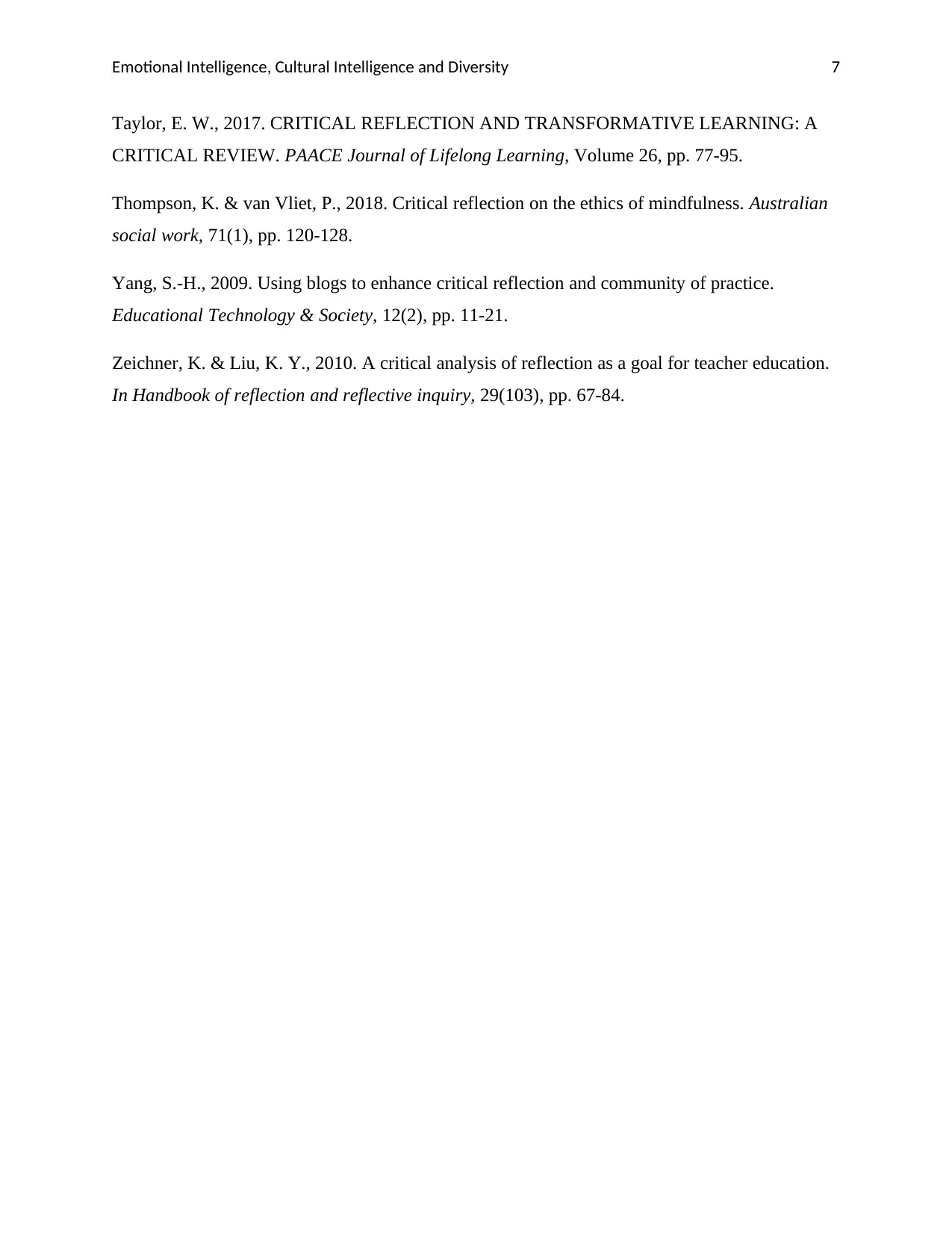
Emotional Intelligence, Cultural Intelligence and Diversity 7
Taylor, E. W., 2017. CRITICAL REFLECTION AND TRANSFORMATIVE LEARNING: A
CRITICAL REVIEW. PAACE Journal of Lifelong Learning, Volume 26, pp. 77-95.
Thompson, K. & van Vliet, P., 2018. Critical reflection on the ethics of mindfulness. Australian
social work, 71(1), pp. 120-128.
Yang, S.-H., 2009. Using blogs to enhance critical reflection and community of practice.
Educational Technology & Society, 12(2), pp. 11-21.
Zeichner, K. & Liu, K. Y., 2010. A critical analysis of reflection as a goal for teacher education.
In Handbook of reflection and reflective inquiry, 29(103), pp. 67-84.
Taylor, E. W., 2017. CRITICAL REFLECTION AND TRANSFORMATIVE LEARNING: A
CRITICAL REVIEW. PAACE Journal of Lifelong Learning, Volume 26, pp. 77-95.
Thompson, K. & van Vliet, P., 2018. Critical reflection on the ethics of mindfulness. Australian
social work, 71(1), pp. 120-128.
Yang, S.-H., 2009. Using blogs to enhance critical reflection and community of practice.
Educational Technology & Society, 12(2), pp. 11-21.
Zeichner, K. & Liu, K. Y., 2010. A critical analysis of reflection as a goal for teacher education.
In Handbook of reflection and reflective inquiry, 29(103), pp. 67-84.
1 out of 8
Related Documents
Your All-in-One AI-Powered Toolkit for Academic Success.
+13062052269
info@desklib.com
Available 24*7 on WhatsApp / Email
![[object Object]](/_next/static/media/star-bottom.7253800d.svg)
Unlock your academic potential
Copyright © 2020–2026 A2Z Services. All Rights Reserved. Developed and managed by ZUCOL.




